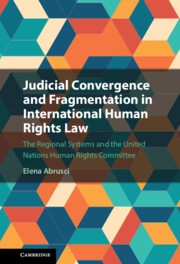 Judicial Convergence and Fragmentation in International Human Rights Law
Judicial Convergence and Fragmentation in International Human Rights Law Published online by Cambridge University Press: 22 December 2022
In the past decades, the international human rights law system welcomed the proliferation of regional and international human rights adjudicatory bodies, as they meant better and closer protection of human rights for people worldwide. Yet, this proliferation also increased the likelihood of conflicting interpretations of fundamental rights and freedoms, which may trigger what we call judicial fragmentation. Judicial fragmentation, described as the situation where two judicial or quasi-judicial bodies issue contrasting judgments, is certainly a double-sided phenomenon. On the one hand, it can bring adverse consequences, such as reduced legitimacy of the adjudicatory bodies, lower protection of human rights and a threat to universality. On the other hand, fragmentation is a constant element in lawmaking and possibly the only way for the law to develop and adapt to new challenges. In 2006, the International Law Commission (ILC) published a report, which found that fragmentation was significantly threatening international law.1 Following such a worrying alert, scholars have started investigating whether fragmentation was also affecting international human rights law (IHRL), reaching the initial conclusion that the situation was not as alarming as expected.
To save this book to your Kindle, first ensure no-reply@cambridge.org is added to your Approved Personal Document E-mail List under your Personal Document Settings on the Manage Your Content and Devices page of your Amazon account. Then enter the ‘name’ part of your Kindle email address below. Find out more about saving to your Kindle.
Note you can select to save to either the @free.kindle.com or @kindle.com variations. ‘@free.kindle.com’ emails are free but can only be saved to your device when it is connected to wi-fi. ‘@kindle.com’ emails can be delivered even when you are not connected to wi-fi, but note that service fees apply.
Find out more about the Kindle Personal Document Service.
To save content items to your account, please confirm that you agree to abide by our usage policies. If this is the first time you use this feature, you will be asked to authorise Cambridge Core to connect with your account. Find out more about saving content to Dropbox.
To save content items to your account, please confirm that you agree to abide by our usage policies. If this is the first time you use this feature, you will be asked to authorise Cambridge Core to connect with your account. Find out more about saving content to Google Drive.